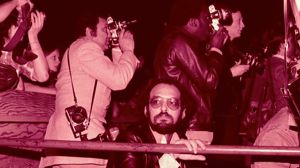You're one of the many people interviewed about the titular Hollywood agent in the documentary Supermensch: The Legend of Shep Gordon. Though your IMDb profile doesn't come right out and say that you're a paparazzi, it mentions that your "iconic photos and videos have been published in magazines and newspapers and can be seen on web sites and television programs around the world, a benchmark in any artist's career." Not once does it allude to the fact that these pictures are usually taken when you are hiding in a shrubbery. But the beauty of showbiz is that you can constantly reinvent yourself. It's all about spin.
In 1968 Shep Gordon checked into the Landmark Motor Hotel in Hollywood, the kind of place that, if it existed now, would find you and your pap brethren camped outside on the regular. On his first day, Shep met fellow guests Jimi Hendrix, Janis Joplin and Jim Morrison, and a casual suggestion from Jimi started him down his career path; "Are you Jewish?", Jimi asked, "You should be a manager." When asked who he should manage, Jimi pointed up at a hotel balcony that housed a very broke Alice Cooper and his band. Their professional arrangement began with a handshake - the two have never had a contract - and has lasted over forty years. Shep's mantra; "Get the money. Always remember to get the money. Never forget to always remember to get the money," the brazen publicity stunts he orchestrated, and his famous, "No Head, No Backstage Pass" t-shirt, made him - for better or worse - the prototype for every aspiring manager since.
Mensch is a Yiddish term for a decent, mature and responsible person. What makes Shep Gordon so super, or at least unusual, is that his commitment to clients goes above and beyond what we've come to expect from the stereotypical sleazy Hollywood suit. After years of living a clicheed Hollywood life of sex, drugs and rock and roll, he moved to Maui where he changed course, becoming a Buddhist, a professionally trained chef, and the adopted father to an ex's grandchildren. He is a trusted confidante and adored friend to huge Hollywood hitters like Sly Stallone and Michael Douglas, who marvel at Shep's ability to stay grounded in an industry that seems to reward bad behavior.
At the other end of the 'adored by huge Hollywood hitters' spectrum, there's you, Derek. You make a living stalking famous people and photographing them, usually when they are at their most vulnerable, which is how you met Shep. Shep's Maui compound has become a home away from home for countless stars needing to escape the madness of L.A. -- Shep and you have an informal agreement wherein you won't film anyone on his property. But who needs a scandal sheet when you've got a storyteller like Shep? In a career spanning over forty years, this guy is the King of Juicy Anecdotes. In fact, this doc relies so heavily on anecdotes and back slapping that it wallows in superficiality. Kind of like those, 'Stars: They're Just Like Us!' photo spreads your magazines are known for.
Recent rock-docs like It Might Get Loud and Joe Strummer:The Future Is Unwritten manage, quite surprisingly, to strike an emotional chord. With Supermensch it's all reverb. We learn very little about Shep's life before his fateful stop at the Landmark, other than that his mother was, in his words, "cruel". Shep's brush with death and his regrets over not having his own children are as deep as first time director Mike Myers is willing to take us, delivering what amounts to a celluloid love letter. Instead, Myers gives us the cinematic equivalent of a tabloid; it's fun, gossipy and light, but in the end is only supermeh.
Don't get overexposed,
Di







